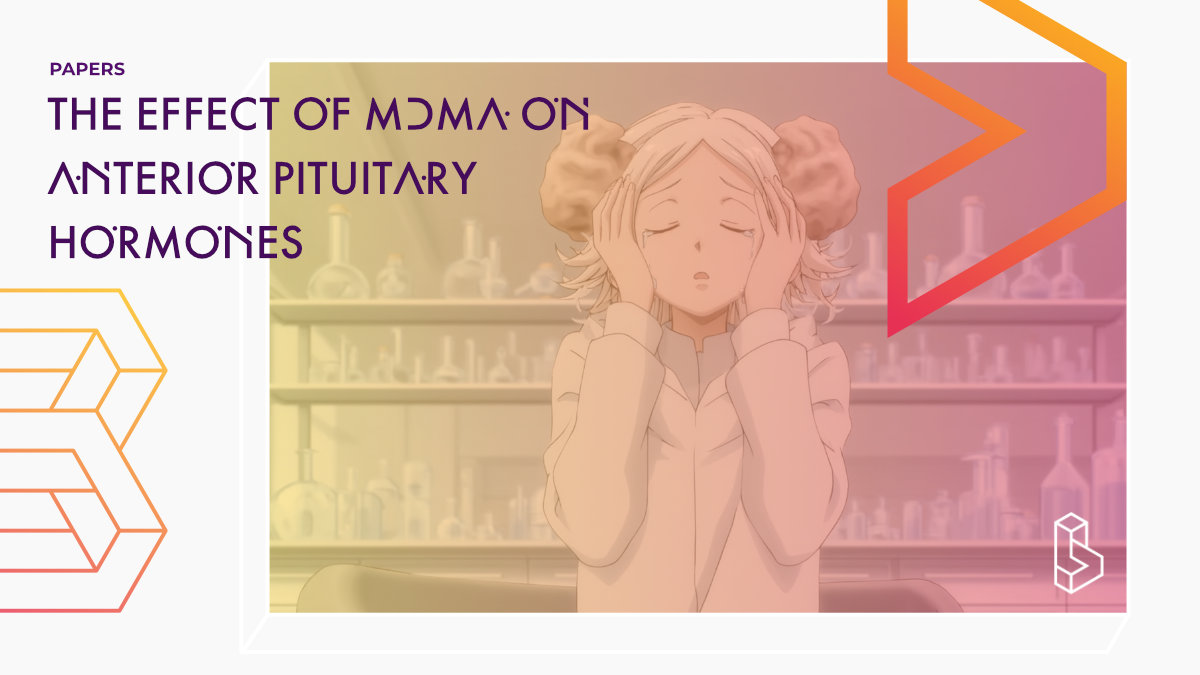This secondary analysis of an RCT (n=15) investigates the acute effects of MDMA (100mg) on anterior pituitary function in healthy adults. It finds that MDMA significantly activates the hypothalamic-pituitary-adrenal (HPA) axis, increasing both ACTH and cortisol levels. No significant effects were observed on other anterior pituitary hormones, though prolactin showed a mild, non-significant increase.
Abstract of The effect of MDMA on anterior pituitary hormones
“Background: 3,4-Methylenedioxymethamphetamine (MDMA), a psychoactive substance, has been proposed as a novel provocation test for oxytocin deficiency. Limited evidence suggests that MDMA may also stimulate the anterior pituitary. Therefore, this analysis aimed to investigate the acute effect of MDMA on the anterior pituitary in healthy adults.
Methods: This secondary analysis utilized data from a double-blind, placebo-controlled, crossover, randomized trial. Healthy participants received a single oral dose of MDMA (100 mg) or placebo in random order. Plasma hormone levels of the anterior pituitary (adrenocorticotropic hormone [ACTH], thyroid-stimulating hormone [TSH], luteinizing hormone [LH], prolactin, growth hormone [GH] and their peripheral endocrine glands (cortisol, free thyroxine [fT4], testosterone, estradiol) were measured at baseline and 120 minutes after drug-intake. Plasma hormone changes following MDMA vs placebo were compared using paired Wilcoxon test.
Results: Fifteen healthy participants (median [IQR] age: 35 years [26–48]; 53% female) with a mean (SD) BMI of 23.2 kg/m2 (2.1), were included. MDMA stimulated the hypothalamic-pituitary-adrenal (HPA) axis, with plasma ACTH increasing from 12 ng/L [11, 15] at baseline to 38 ng/L [25, 59] at 120 minutes, resulting in a significant change of ACTH (p<0.001). This was accompanied by a cortisol increase from 347 nmol/L [252, 409] to 566 nmol/L [457, 701], resulting in a significant change of cortisol (p=0.006). Prolactin showed a mild change of f 4 μg/L [-1,12] (p=0.062). No effects of MDMA were observed on the remaining anterior pituitary axes.
Conclusion: MDMA strongly activates the HPA axis, in addition to stimulating oxytocin, suggesting that MDMA may serve as a novel stimulation test for assessing the two pituitary axes simultaneously. Further validation in larger patient populations is necessary.“
Authors: Cihan Atila, Sara-Jessica Camerin, Matthias E. Liechti & Mirjam Christ-Crain
Summary of The effect of MDMA on anterior pituitary hormones
MDMA (3,4-methylenedioxymethamphetamine), commonly known as ecstasy, is a psychoactive drug with well-documented effects on the central nervous system, including modulation of the cardiovascular, neuropsychological, and endocrine systems. While earlier studies have established that MDMA stimulates the release of oxytocin from the posterior pituitary, its effects on the anterior pituitary remain less clearly understood.
The anterior pituitary is responsible for secreting several key hormones, including ACTH (adrenocorticotropic hormone), TSH (thyroid-stimulating hormone), GH (growth hormone), LH (luteinizing hormone), prolactin, and others. Animal studies have suggested that MDMA may stimulate the hypothalamic-pituitary-adrenal (HPA) axis and the thyroid axis. In humans, elevated cortisol levels have been reported after MDMA administration, but it remains unclear whether this is due to direct adrenal stimulation or through activation of the anterior pituitary via ACTH. Evidence about MDMA’s impact on other axes like the gonadal or growth hormone systems in humans is inconsistent.
Diagnosing hypopituitarism often involves dynamic hormone stimulation tests that are time-consuming and complex. Since MDMA can stimulate both oxytocin and possibly ACTH, the researchers hypothesised that it might serve as a novel diagnostic provocation agent that simultaneously evaluates both posterior and anterior pituitary function.
Methods
Trial Design
Find this paper
https://doi.org/10.1530/ec-25-0254
Open Access | Google Scholar | Backup | 🕊
Cite this paper (APA)
Atila, C., Camerin, S. J., Liechti, M. E., & Christ-Crain, M. (2025). The effect of MDMA on anterior pituitary hormones: a secondary analysis of a randomized placebo-controlled trial. Endocrine Connections, 1(aop).
Study details
Compounds studied
MDMA
Placebo
Topics studied
Healthy Subjects
Neuroscience
Study characteristics
Original
Original Re-analysis
Placebo-Controlled
Double-Blind
Within-Subject
Randomized
Re-analysis
Bio/Neuro
Participants
15
Humans
Compound Details
The psychedelics given at which dose and how many times
MDMA 100 mg | 1xLinked Research Papers
Notable research papers that build on or are influenced by this paper
Oxytocin in response to MDMA provocation test in patients with arginine vasopressin deficiency (central diabetes insipidus): a single-centre, case-control study with nested, randomised, double-blind, placebo-controlled crossover trialThis double-blind, placebo-controlled study (n=30) explores oxytocin deficiency in patients with arginine vasopressin deficiency (central diabetes insipidus), using MDMA as a biochemical and psychoactive provocation test. The participants included patients with vasopressin deficiency and healthy controls, who were given either MDMA or placebo in a randomized order over two sessions.
Linked Clinical Trial
Circulating Oxytocin Changes in Response to the Oxytocin System Stimulator MDMA in Patients With Diabetes Insipidus and Healthy ControlsThis randomized, double-blind, placebo-controlled crossover trial (n=30) called OxyMA aims to investigate the changes in circulating oxytocin levels in response to the oxytocin system stimulator MDMA in patients with diabetes insipidus and healthy controls.

